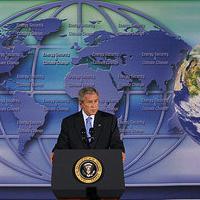IT ALL STARTED WITH MALTA -- It was clear from U.N. Secretary General Ban Ki-moon's personal involvement with last Monday's summit on climate change sponsored by the world body that he wants to make the issue a priority of his term of office. A senior U.N. adviser said shaping the proposed post-Kyoto agreement (the Kyoto Protocol emission reduction targets will expire in 2012) will continue to be one of Ban Ki-moon's main targets. The Korean doesn't have his predecessor Kofi Annan's public persona, but inside the organization he is widely judged to have had an effective first year in the job. As he opened the summit attended by some 80 heads of state of government, Ban Ki-moon recalled that the U.N.'s focus on climate change originated with a 1988 proposal by "the island state of Malta" -- population barely 400,000 -- to address the "protection of global climate for present and future generations of mankind." From there followed the adoption of the United Nations Convention on Climate Change (1992) and the Kyoto Protocol (2007).
Corridors of Power: Climate Change, Spain and the American Revolution

